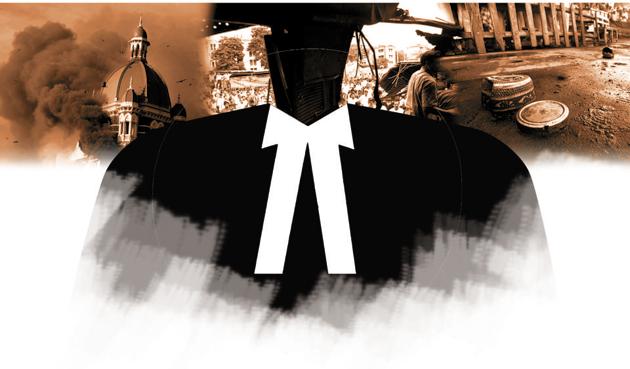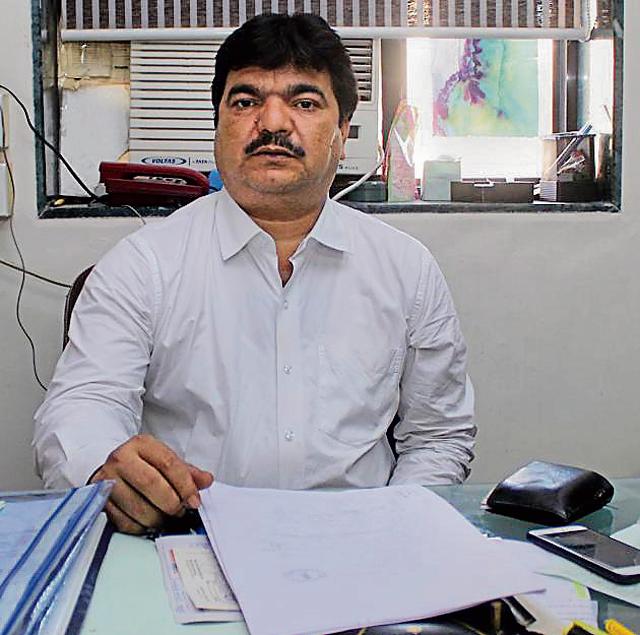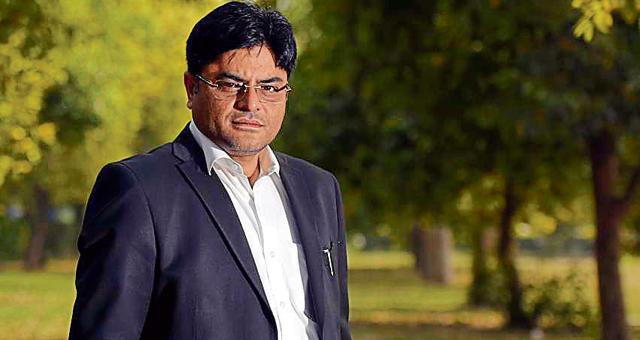Threats, slurs, insults: It’s a hard life for lawyers defending terror suspects
Your client may be acquitted, but life will likely never be the same. Friends and neighbours shun you, loved ones question your motives.
Advocate R Mahadevan has relatives who won’t talk to him any more. They don’t understand why he represents ‘people who hate their country’.

“I tried explaining the importance of a defence lawyer, but now I have just come to accept these things,” Mahadevan says.
He is currently representing suspects in the Bangalore serial blasts case, when nine bombs exploded in the city in 2008, killing 2 and injuring 20.
It’s not easy arguing for the damned. Threats of violence and death are common. Some lawyers find notes stuck on their cars, detailing the whereabouts of their children.
And then there are the attacks from within their circle — friends distance themselves; neighbours ask, why do you do it? At a family wedding, a relative may start an argument; during a festive gathering, suddenly the focus shifts to you.
“At a friend’s son’s wedding, I was asked by a relative, ‘Why did you undo the hard work done by the police?’ It was disturbing to think that even people who know me think of my work like this.”

In Lucknow, Mohammad Shoaib was beaten up in a courthouse, by other lawyers, for defending Aftab Alam Ansari, accused in the 2007 Lucknow court blast case. Charges against him were later withdrawn. “I had evidence that Ansari was at a doctor’s office on the day of the blast,” Shoaib says
But terror is one of those crimes where you are guilty, to most of society, until proven innocent. Which is why, constitutional experts say, the role of the criminal defence attorney in terror cases is even more vital.
Multiple acquittals in cases like the Akshardham temple attack of 2002 (all six accused acquitted) and the Delhi serial blasts of 2005 (two of three acquitted), with the judgements raising questions about the investigation process, underline this point.
“A large number of innocent people are arrested in terror-related cases,” says civil rights lawyer and activist Prashant Bhushan. “Most of these suspects are poor and can’t afford good lawyers. In such a situation, not only should there be more lawyers to fight their cases but more organisations helping them with lawyers who will fight pro bono.”
Instead, such organisations are few and fiercely embattled.
The legal cell of the Jamiat Ulema-i-Hind, one of India’s largest Muslim NGOs, is currently funding representation for over 600 people accused in cases across the country, most but not all of them Muslim.
Since 2007, when the organisation started supporting such cases, they have seen 120 people acquitted.
“In the beginning, there was only Shahid Azmi working on such cases in Mumbai. Now we have five lawyers willing to help in the city. We also have lawyers in Delhi and Uttar Pradesh. But Shahid Azmi was killed, the other lawyers they are routinely threatened and the establishment makes light of these threats,” says Gulzar Azmi, secretary of the legal cell.
(With inputs from Poulomi Banerjee)
‘I WAS TOLD, WHY DO YOU NEED A GUN? THE TERRORISTS WILL DEFEND YOU’
Sharif Shaikh, 44, Mumbai
Has represented terror suspects in the twin blasts at Gateway of India and Zaveri Bazar; the 11/7 Mumbai serial train blasts, and the Ghatkopar bus blast of 2002.
Sharif Shaikh is never alone. He commutes with colleagues. At court and when heading out for an after-lunch stroll, he takes at least two others along. “I used to enjoy my independence. I used to like to go on long walks alone, but for the last few years my life has been like this,” says the Mumbai-based advocate.
Shaikh began practice as a criminal defence lawyer in 2001.

A year later, a bomb exploded on a bus in the eastern suburb of Ghatkopar, killing two and injuring 50. Among the eight people arrested was Arif Paanwalla. His brothers, who knew Shaikh, were desperate.
“They said there was no way he could have been involved, and asked if I could help,” he remembers.
The charges hinged on the testimony of one witness, the conductor of the BEST bus. The case took an about-turn when that witness turned hostile, in March 2005. “Sometimes people are asked to lie because it will be a service to the nation and good for national security. That kind of thing is depressing,” he says.
All eight suspects in that case were acquitted by mid-2005.
Since then, Shaikh has taken on more than 20 terror cases. Four of these clients have been acquitted; two convicted. The rest are ongoing.
His public image, though, has been tarnished by his work.
“People consider the accused to be a terrorist as soon as the investigating body arrests them,” he says. “At a friend’s son’s wedding, I was asked by my cousin, ‘Why did you undo the hard work done by the police?’ It was disturbing to think what even people who know me, think of my work like this.”
Shaikh says that in that instance he at least had the opportunity to present his side. “I explained how, in many cases, my work has exposed flaws in the investigation. Thankfully, my cousin listened with interest and seemed to change his mind,” he says.
Pressure comes in different forms. Sometimes, it is direct threat calls, sometimes an extra round of grilling by security guards at the entrance to a courthouse.
“I was once told by a guard, ‘Why have you come here? We cannot ensure your safety if something happens’” he says.
Sometimes pressure comes from the family too. “My mother and my wife sometimes tell me I should stop taking such cases so that we can have a normal life. But they also know the helplessness of the people I fight for,” he says.
The attitude of the government has not been too helpful either. “When I first started getting threats in 2014, I applied for a gun licence. My application was rejected. I went to a state minister to appeal and he mocked me, saying, ‘Why do you need a gun when terrorists will defend you anyway’,” Shaikh says.
“OURS IS A HORRIBLE LIFE”
Abdul Wahab Khan, 46, Mumbai
Represented suspects in the Zaveri Bazar blasts case of 2003 and the 26/11 terror siege of 2008.
“Being a defence lawyer is horrible,” says Khan, who has been practising since 1998.
After five years of handling cases of robbery and murder, he took up his first terror related case after the Zaveri Bazar blasts, where two powerful bombs concealed in parked taxis exploded in the packed Mumbai market, killing 50 people and wounding 129.

The threats began almost immediately, anonymous calls telling him to drop the case.
“It’s frightening,” he says. “I worked with advocate Shahid Azmi for years, and he would talk about the death threats he got for representing people accused in cases like the serial train blasts of 2006 and the Malegaon bombing of 2006, and he was finally murdered in 2010.”
Fighting these cases has consumed his life and he says that work is something that he lives with every waking minute. “I am cross-questioning three or four witnesses in different cases every day, which more or less takes up all my time,” he says.
The pressure comes in indirect ways too. “Recently, a client was sent a message in jail, through another under-trial, that he should not take me on as his advocate because I would intentionally lose the case. That hurt,” he says.
Meanwhile, his wife and children have been affected; as have his earnings.
Most of his terror cases are done pro bono. “In a way, I am able to fund my time and effort on those cases because my earnings from other cases,” he says.
The stresses of juggling his workload and worrying about clients who face a possible death sentence have taken a toll too.
“To defend a man who is pitted against the sentiments of most of society and the system, one has to give it one’s all,” he says. “In cases like this, you are fighting for a man who is virtually on his deathbed.”
This leaves little time for a social or even a personal life. “Over the past two years, I have taken stock of my life and started to make some changes,” he says. “I hardly took any vacations for almost 15 years. Now I ensure that I take some time off each year with my family, and at least I come back refreshed.”
The threats have more or less ceased to matter. “I’m more concerned with finding out why someone is willing to lie on the stand, and how to break him,” Khan says.
“I’VE HAD NOTES PASTED ON MY CAR, THREATENING MY FAMILY”
Muhammad Shahwar Khan, 43, Delhi
Represented Syed Abdul Karim alias Tunda, an alleged bomb-maker for the Lashkar-e-Taiba terror outfit.
Advocate Muhammad Khan, who practices in the Patiala House court in New Delhi, took up his first terror-related case in 2001.
“The Special Cell of the Delhi Police had arrested four people. The allegations were that they had planted bombs at Sena Bhawan, Dalhousie Road, India Gate and caused explosions at the BSF Headquarters. All four were eventually acquitted as the prosecution could not prove the charges,” he says.
“As soon as one gets the chargesheet, a good lawyer can see through it. But whether a client is innocent or not is not the job of the lawyer. His job is to represent the accused to the best of his ability.”

He tries to keep his personal life far from his professional life and tries not to get emotionally attached to a client or the case. “I may not be able to do justice to a case if I get emotionally involved,” he says.
But his family has been drawn in. “Soon after I took up the first case, I used to get calls from unknown numbers, some international, asking me to withdraw from cases. Later, there were chits pasted on my car with details of my family members. The last one was an SMS with a death threat, after which I have to move around with police security for a while,” he says.
But he does not let the pressure take over. “If I thought too much about it, I wouldn’t have been able to follow up on even one case. I never think about these things,” he says.
To unwind from the long days and stressful work, he indulges his passions for photography and driving in the hills. A team of friendly colleagues helps matters.
“I play for the Patiala Court Bar cricket team,” he says, chuckling.
But outside the city, the attitude of fellow lawyers has not always been friendly. “I went to Mathura in Uttar Pradesh in 2009 to represent a terror suspect who has been in jail for over 14 years. Over 300 local lawyers surrounded me outside the courthouse, shouting slogans against me. It was terrifying,” he says. “But when you do a good job, and the holds in the case are exposed, there is a special joy in seeing an innocent man go free.”
“THERE WAS A TIME MY FRIENDS WOULD AVOID ME”
Khalid Shaikh, 46, Ahmedabad
Has been representing 123 alleged members of the banned outfit SIMI since 2001
“Have you seen Jolly LLB 2?” asks Khalid Shaikh, referring to the 2013 dark comedy about a lawyer fighting a rich man on behalf of a group of poor labourers. “The film shows things in a lighter vein, but I really identify with it,” Shaikh says. “It’s one of the few films I’ve made time to see.”
In some ways, time has stood still for Shaikh since 2001. That’s the year the government of India banned the Students Islamic Movement of India, for alleged involvement in terror acts, and 123 people were arrested in Ahmedabad.

With support from my seniors I plunged into the cases as I was convinced that many of them were innocent of any wrongdoing,” Shaikh says. “In a year, all the accused got bail. But the final judgement just keeps dragging. Some of these people are bright professionals who cannot go abroad unless they are acquitted.”
On the upside, that case gave him the confidence to fight in other cases where society and the system were heavily pitted against the accused, like the Akshardham temple attack case of 2002.
His family is a big reason he has been able to carry on. “They value the work I am doing,” he says. “They saw the men’s faces when six accused were acquitted by the Supreme Court in the Akshardham case, with a strongly worded judgement against the investigating agency. It’s a special kind of joy when you are finally able to get justice for someone falsely accused.”
But he has not always been the toast of the town. Some friends avoided him when he was on sensitive cases. “No one said anything directly but I could feel I was being excluded from get-togethers,” he says. “They do understand that I work for the wronged.”
“THE TWO EXTREME NARRATIVES ABOUT MUSLIMS ANGER ME”
Parvez Alam, 50, Bhopal
Has been representing the families of two SIMI activists killed in an alleged fake encounter last year.
Senior lawyer Parvez Alam took up his first terror related case in 2009, when 14 persons were arrested under the UAPA in Madhya Pradesh for possessing banned literature and illegal arms. “They were all acquitted in two years,” he says.
He was also fighting the case of the alleged SIMI activists who were killed last year in what has been claimed to be a fake encounter. He is suspicious when first approached about his work. “How do I know who are you, or on whose behalf you work,” he says.

After some confirmation of identity, he continues, “I am always concerned about my children and try to keep them away from my professional world. I track them at all times.”
One thing he will talk about: The fact that almost all the terror suspects cases he has represented are Muslim men.
“I am completely against religious bias. There are two narratives about Muslims being spread: one of a peaceful Muslim and the other of an extremist, I think both are rubbish. Like every community, there are all kinds of Muslims, because that is how humans are,” he says.
His cases, he adds, drag on for many years and leave little time for anything else. “Since 2009, I have attended about two or three weddings. Whenever I go out of town I have to return within days,” he says.
Being identified as a ‘terrorist’s lawyer’ has been hard too. “A few months ago, I went out to buy clothes and the shopkeeper came up to me and asked, ‘Why do you take up such cases?’ I was a little upset and took a while to explain that till a murder has been proven, one cannot be called a murderer. Similarly, till the case has been proven, someone cannot be called a terrorist either,” he says.



